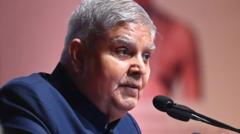In a surprising turn of events, Zia Yusuf, the chairman of Reform U.K., has announced his resignation, marking a significant moment of turmoil within the anti-immigration party helmed by Nigel Farage. Yusuf's exit follows a clash over controversial comments made by MP Sarah Pochin, who advocated for Prime Minister Keir Starmer to impose a ban on the burqa.
Yusuf, who portrayed himself as "a British Muslim patriot," criticized Pochin's remarks as "dumb," arguing that they contradicted the party's established policy from the recent general election. This internal disagreement highlights growing rifts within Reform U.K., as differing ideological perspectives come to the forefront.
While Yusuf's resignation can be viewed as a setback for the party's efforts to solidify its presence in British politics, other influential figures within the party have voiced contrasting viewpoints. Reform's chief whip, Lee Anderson, supported Pochin's stance, asserting, "No one should be allowed to hide their identity in public," indicating a faction within the party that is eager to pursue more hardline policies.
Despite the tensions, Yusuf did not elaborate on his reasons for resigning, expressing doubts about the viability of continuing his efforts for a Reform government in a brief social media statement. His departure underscores the challenges Reform U.K. faces as it navigates its internal dynamics amid external pressures in an increasingly polarized political landscape.





















